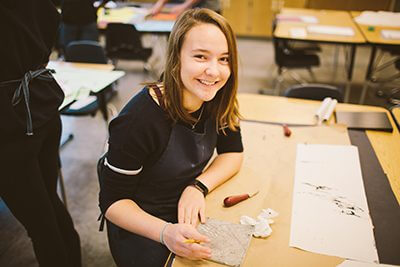December 14, 2017
 by Dr. Bill Hudson, Head of School
by Dr. Bill Hudson, Head of School
You may have heard that MPA ninth grade student, Maya Peterson, wrote a book for young people about the importance of investing. Her book, Early Bird: The Power of Investing Young, was recently published by Amazon and makes the point that it is not too early for young people to begin investing in the stock market and provides valuable insights and motivation to do so. Although I have not yet read Maya’s book, one theme seems to emerge: that investing in the stock market is one way for young people to make a social impact on the world.
Much of what led Maya to write her book reflect the hopes and characteristics of her generation, Generation Z. A great deal of research has been done and is sometimes contradictory. While it is challenging to reduce a diverse group of people to a series of attributes, there are themes that emerge that are useful for parents, educators, employers, marketers, industry, etc.
Gen Z carries a less idealistic, more pragmatic perspective on the world. According to a recent study conducted by Barnes and Noble College, they are more practical and financially-driven than their Millennial counterparts, and their preference for self-learning fuels a curiosity and concern about personal fulfillment and social impact. Although they are very independent and technologically savvy, Gen Zers value face-to-face interaction and collaboration.
At approximately 60 million, native-born American members of Generation Z outnumber their endlessly dissected millennial older siblings by nearly one million, according to census data compiled by Susan Weber-Stoger, a demographer at Queens College. Lucie Greene, the worldwide director of the Innovation Group at J. Walter Thompson, calls them “millennials on steroids.” Generation Z shares many of the same characteristics of millennials, only more of them.
Gen Z are the first, true digital natives, raised in the era of smartphones. As a result, Gen Zers consume information in short, bite-sized nuggets that reflects their attention span. They watch between two and four hours of YouTube and under an hour of television a day. Gen Z tends to be more concerned about their privacy on social media, favoring Shapchat over Facebook, for instance, than their predecessors, the Millennials.
As learners, Generation Z learns by doing, collaborating, and integrating. They embrace a social learning environment and seek opportunities to be directly involved in hands-on learning. For instance, 51 percent of surveyed students said they learn best by doing, while only 12 percent said they learn through listening. These same students also mentioned they tend to enjoy class discussions and interactive classroom environments over the traditional dissemination teaching method.
The importance of social-emotional skills, practicing empathy, becoming inclusive, and forming collaborative work environments to the education of Generation Z cannot be understated. In the age of smart machines, developing what is uniquely human is at the heart of preparing Generation Z for their careers. One national educational think tank urges educators to focus more on helping people develop uniquely human aptitudes and practice resilience rather than training them for specific jobs or skills. Without a focus on the inner human core, rapid skill development will be very difficult. While it is impossible to accurately predict what young people will need to be successful in whatever career they choose, in an article published in Education Week, reporter Ben Herold concludes that, “The best guess is to combine technical ability with passion, people skills, and the probing mind of a scientist.”
MPA is uniquely positioned to meet the needs of Generation Z. Experiential. Hands-On. Engaging the “whole child.” Dynamic. And in this century, it is more relevant than ever. At MPA, we create classrooms that encourage students to be architects of their own learning, where they take risks, view the world through multiple lenses, utilize innovative tools in both expected and unexpected ways, collaborate with one another in pursuit of learning, and demonstrate knowledge across and between disciplines. The Generation Z student body at MPA is truly amazing, and I am confident they will go on to do great things with their lives. If Generation Z is composed of students like ours, we are in good hands.
Barnes and Noble College, Getting to Know Gen Z: Exploring Middle and High Schoolers’ Expectations for Higher Education, 2016
(Knowledge Works, The Future of Learning: Redefining Readiness from the Inside Out, 2017).
(Benjamin Herold, “The Extraordinary Education of an Elite, 13-Year-Old Problem-Solver,” Education Week, Sept. 26, 2017)